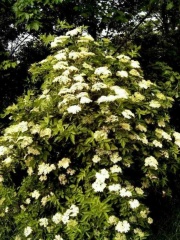Difference between revisions of "Elderberry"
Jump to navigation
Jump to search
(username removed) |
|||
| (3 intermediate revisions by 3 users not shown) | |||
| Line 2: | Line 2: | ||
== Description == | == Description == | ||
| − | A small purple berry from a shrub, ''Sambucus canadensis'', also known as the common American elderberry. The smooth green stems from the elderberry bush were used to make an ancient musical instrument known as the sambuca. They are also used for whittling whistles. The ripe berries were used for ink, dyes, food, wine, and home remedies. [ | + | A small purple berry from a shrub, ''Sambucus canadensis'', also known as the common American elderberry. The smooth green stems from the elderberry bush were used to make an ancient musical instrument known as the sambuca. They are also used for whittling whistles. The ripe berries were used for ink, dyes, food, wine, and home remedies. [[Alum]] was added to make the color insoluble. |
== Synonyms and Related Terms == | == Synonyms and Related Terms == | ||
| − | common American elderberry (''Sambucus canadensis''); hyld (Dan.); Holunder (Deut.); sureau (Fr.); vlier (Ned.); hyll (Nor.); bez (Pol.); | + | common American elderberry (''Sambucus canadensis''); hyld (Dan.); Holunder (Deut.); sureau (Fr.); vlier (Ned.); hyll (Nor.); bez (Pol.); fläder (Sven.); saúco (Esp.); sweet elder; sambuca; bore-wood |
| − | [[File:elderberryfruitv1.jpg|thumb|Elderberry fruit | + | [[File:elderberryfruitv1.jpg|thumb|Elderberry fruit ''Sambucus nigra canadensis'')]] |
| + | ==Physical and Chemical Properties== | ||
| − | + | * Shrub heights to 8 m | |
| − | == | + | * Flowers= small white in dense flat-topped clusters |
| + | * Fruit=clusters of purple-black berries | ||
| − | + | ==Resources and Citations== | |
| − | + | * R.J. Adrosko, ''Natural Dyes in the United States'', Smithsonian Institution Press, Washington, DC, 1968 | |
| − | * | + | * ''Encyclopedia Britannica'', http://www.britannica.com Comment: "Elder." Accessed 19 Aug. 2004 . |
| − | * | + | * Virginia Tech Dendrology website at www.fw.vt.edu/dendro/dendrology/main.htm (accessed Oct. 3, 2005) |
| − | * | + | * Wikipedia: http://en.wikipedia.org/wiki/Elderberry (Accessed Oct. 3, 2005) |
| − | * | + | * Random House, ''Webster's Encyclopedic Unabridged Dictionary of the English Language'', Grammercy Book, New York, 1997 |
| − | |||
| − | |||
* ''The American Heritage Dictionary'' or ''Encarta'', via Microsoft Bookshelf 98, Microsoft Corp., 1998 | * ''The American Heritage Dictionary'' or ''Encarta'', via Microsoft Bookshelf 98, Microsoft Corp., 1998 | ||
Latest revision as of 12:43, 1 August 2022
Description
A small purple berry from a shrub, Sambucus canadensis, also known as the common American elderberry. The smooth green stems from the elderberry bush were used to make an ancient musical instrument known as the sambuca. They are also used for whittling whistles. The ripe berries were used for ink, dyes, food, wine, and home remedies. Alum was added to make the color insoluble.
Synonyms and Related Terms
common American elderberry (Sambucus canadensis); hyld (Dan.); Holunder (Deut.); sureau (Fr.); vlier (Ned.); hyll (Nor.); bez (Pol.); fläder (Sven.); saúco (Esp.); sweet elder; sambuca; bore-wood
Physical and Chemical Properties
- Shrub heights to 8 m
- Flowers= small white in dense flat-topped clusters
- Fruit=clusters of purple-black berries
Resources and Citations
- R.J. Adrosko, Natural Dyes in the United States, Smithsonian Institution Press, Washington, DC, 1968
- Encyclopedia Britannica, http://www.britannica.com Comment: "Elder." Accessed 19 Aug. 2004 .
- Virginia Tech Dendrology website at www.fw.vt.edu/dendro/dendrology/main.htm (accessed Oct. 3, 2005)
- Wikipedia: http://en.wikipedia.org/wiki/Elderberry (Accessed Oct. 3, 2005)
- Random House, Webster's Encyclopedic Unabridged Dictionary of the English Language, Grammercy Book, New York, 1997
- The American Heritage Dictionary or Encarta, via Microsoft Bookshelf 98, Microsoft Corp., 1998

